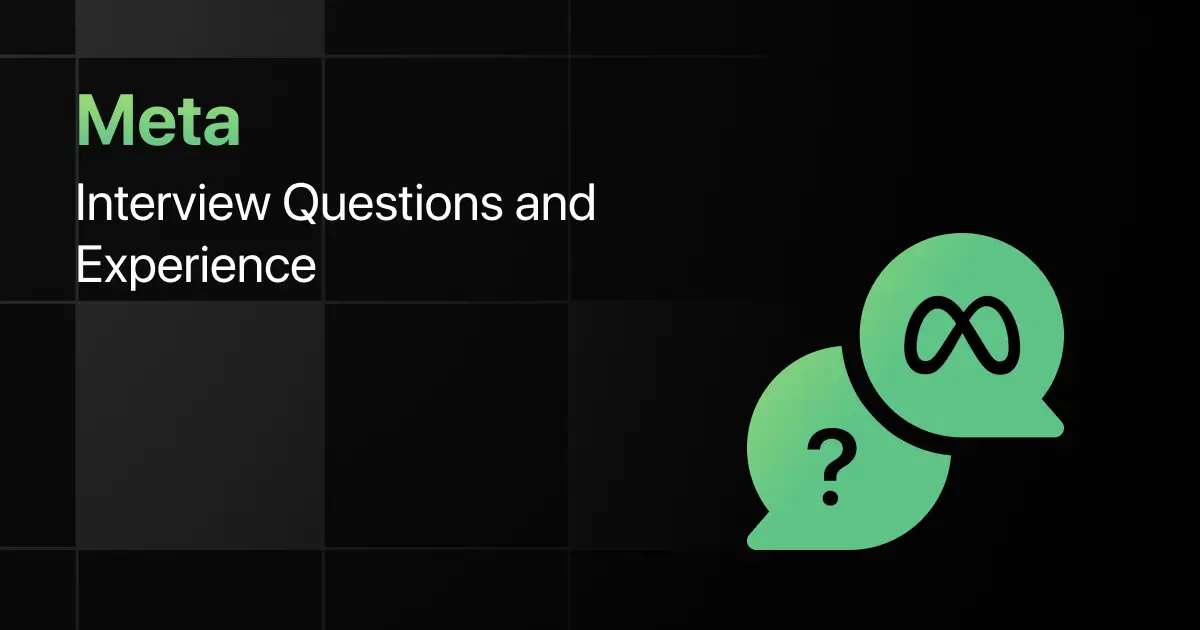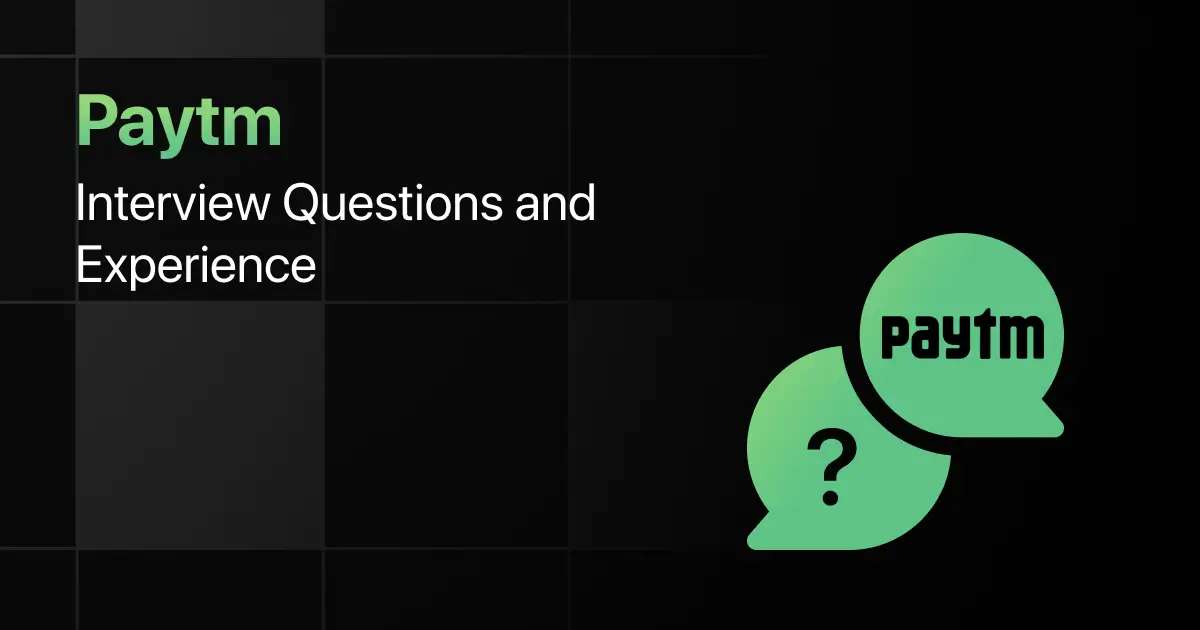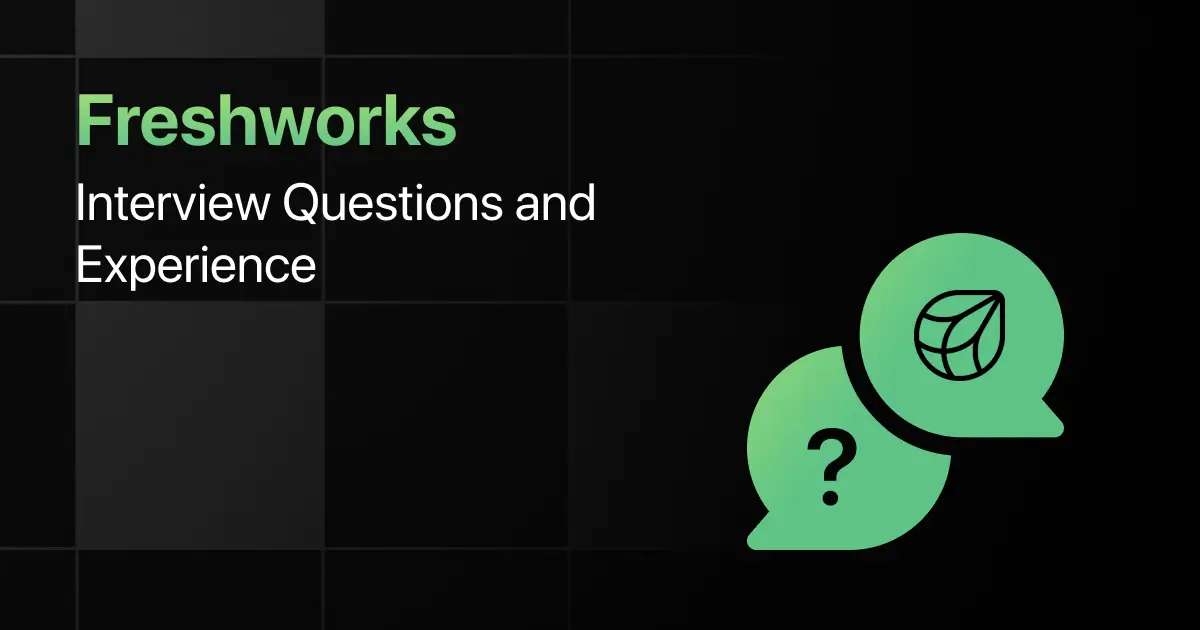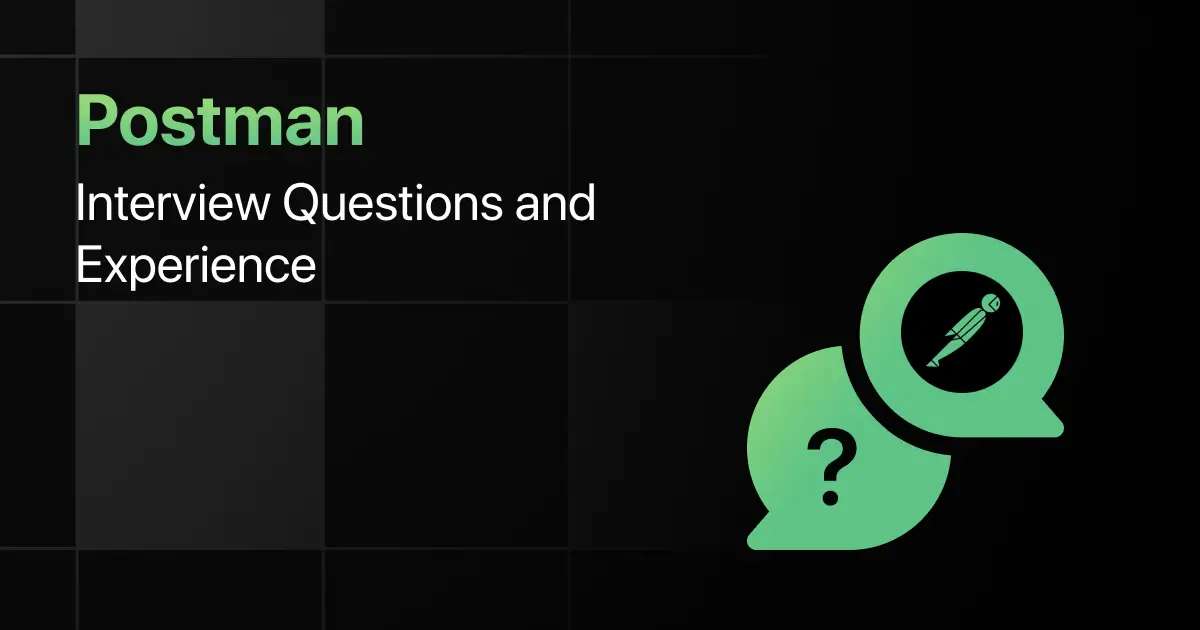Facebook Interview Questions and Experience

Have you ever imagined what it takes to land a job at Meta (Facebook), one of the most influential tech companies in the world? Known for products like Facebook, Instagram, and WhatsApp, Meta hires some of the best engineering talent globally.
The Facebook interview process is intense and highly structured. It doesn’t just test coding ability but also evaluates problem-solving, scalability, and cultural alignment with Meta’s mission of connecting the world. Candidates are expected to demonstrate both technical expertise and collaborative thinking.
In this blog, we’ll take you through the Meta hiring process, common interview questions, real candidate experiences, preparation tips, and FAQs to help you prepare effectively.
Meta/Facebook Hiring Process – Overview
Here’s a quick overview of Facebook’s hiring process:
| Category | Details |
|---|---|
| Eligibility | Open to both freshers and experienced candidates. Preferred degrees include B.E/B.Tech, M.Tech, MCA, or equivalent in Computer Science, IT, or related fields. |
| Rounds | Typically 4–6 rounds: Online Assessment, Technical Interviews (DSA, System Design, Algorithms), Behavioral/Cultural Fit, and Final HR. |
| Job Roles Offered | Software Engineer (SWE), Data Engineer, Product Manager, Machine Learning Engineer, Research Scientist, and Infrastructure Engineer. |
| Salary Range | Freshers: ₹18 – 22 LPA (SWE roles); Experienced: ₹35 – 70 LPA depending on role and level (based on Glassdoor & AmbitionBox). |
| Apply Link | Apply Now |
Top Facebook Interview Questions with Answers
The interview process at Meta is designed to test technical strength, role-specific knowledge, and cultural alignment. Below are some commonly asked questions with sample answers to help you prepare.
1. Technical Questions
- What is the difference between concurrency and parallelism?
Concurrency is handling multiple tasks at once (not necessarily simultaneously), while parallelism is executing tasks simultaneously using multiple processors. - Explain the difference between TCP and UDP.
TCP is connection-oriented, reliable, and ensures data delivery. UDP is connectionless, faster, but doesn’t guarantee delivery or order. - What is a race condition, and how do you prevent it?
A race condition occurs when multiple threads access shared data simultaneously. It is prevented using locks, semaphores, or atomic operations. - Explain how a hash table works.
A hash table maps keys to values using a hash function. Collisions are handled with techniques like chaining or open addressing. - What are the differences between process and thread?
A process is an independent execution unit with its own memory, while threads share memory within a process, making them lightweight. - How does garbage collection work in Java?
Garbage collection automatically removes unused objects to free memory, using algorithms like Mark-and-Sweep or Generational Collection. - What is the difference between SQL and NoSQL?
SQL is structured, relational, and schema-based. NoSQL supports unstructured data, high scalability, and flexibility for large-scale applications. - What is sharding in databases?
Sharding is horizontal partitioning of data across multiple servers to improve performance and scalability in large distributed databases. - Explain CAP theorem in distributed systems.
CAP theorem states a distributed system can only guarantee two of Consistency, Availability, and Partition Tolerance simultaneously. - What is CDN and why is it important?
A Content Delivery Network caches content across servers worldwide, reducing latency and improving website performance for global users. - What is a deadlock, and how can it be avoided?
Deadlock happens when processes wait indefinitely for resources. Avoid it using ordering, timeout, or avoiding circular wait. - What are load balancers and their types?
Load balancers distribute traffic across servers. Types include Layer 4 (transport-level) and Layer 7 (application-level) balancing. - Explain the difference between REST and GraphQL.
REST uses fixed endpoints and returns full data, while GraphQL allows flexible queries, fetching only required fields. - What is an API rate limiter, and why is it needed?
A rate limiter restricts the number of API calls in a timeframe, preventing abuse and maintaining system stability. - What is idempotency in APIs?
Idempotency ensures multiple identical requests have the same effect, preventing issues like duplicate payments.
2. Role-Based Questions
For Freshers (SDE-1)
- Why do you want to join Meta as a fresher?
Meta offers challenging problems at scale and opportunities to learn from world-class engineers, making it ideal for career growth. - How do you approach solving algorithmic problems?
I start with brute force, identify inefficiencies, optimize step by step, and clearly explain my thought process to the interviewer. - What’s your favorite project, and why?
My favorite project was a social media clone app because it taught me about scalability, authentication, and real-world system design basics. - How do you keep improving your problem-solving skills?
By solving DSA problems daily, participating in coding competitions, and reviewing solutions to learn alternative approaches.
For Data Analysts
- How would you analyze user engagement on Facebook posts?
By tracking KPIs like likes, shares, comments, time spent, and using visualization tools for trend analysis. - How do you deal with missing data in a dataset?
I use techniques like mean/median imputation, forward fill, or removing incomplete rows depending on context. - Explain the difference between supervised and unsupervised learning.
Supervised learning uses labeled data for prediction, while unsupervised learning finds hidden patterns in unlabeled data. - How would you measure the success of a new feature in Facebook?
By defining KPIs like daily active users, retention, and engagement rate, then running A/B testing.
For Backend Developers
- How would you design a scalable messaging system like Messenger?
By using distributed databases, message queues, load balancers, and ensuring fault tolerance with replication. - Explain the role of caching in backend systems.
Caching reduces latency and database load by storing frequently accessed data closer to the application. - How would you handle billions of API requests daily?
Using load balancers, sharding, asynchronous processing, and distributed queues to ensure system scalability. - What’s the difference between synchronous and asynchronous communication in services?
Synchronous waits for response (blocking), while asynchronous allows tasks to continue without waiting, improving throughput.
For Managers
- How do you prioritize tasks when leading multiple projects?
I balance urgency, impact, and resources, using frameworks like MoSCoW or RICE for prioritization. - How do you resolve conflicts in your team?
By facilitating open communication, understanding both perspectives, and reaching a solution aligned with project goals. - How do you measure success of your team?
Through delivery timelines, code quality, project outcomes, and peer reviews, rather than just hours spent. - How do you motivate engineers during challenging projects?
By acknowledging difficulties, setting achievable goals, and recognizing individual contributions to maintain morale.
3. Behavioral Questions
- Tell me about a time you had to work with a difficult teammate.
I stayed professional, focused on shared goals, and resolved differences through open communication. - Describe a situation where you had to learn a new skill quickly.
During an internship, I learned Docker within a week by following tutorials and applying it to project deployment. - How do you handle failure in projects?
I analyze what went wrong, learn from mistakes, and implement corrective measures for future success. - Tell me about a time when you showed leadership in a project.
I delegated tasks, maintained regular check-ins, and ensured deadlines were met, helping the team succeed. - How do you handle high-pressure deadlines?
By breaking tasks into smaller milestones, prioritizing effectively, and staying calm under pressure. - Describe a time when you gave constructive feedback.
I pointed out inefficiencies in a peer’s code, suggested improvements, and helped implement them together. - How do you adapt to changing project requirements?
I reassess priorities, adjust timelines, and collaborate with stakeholders to align with new goals. - Give an example of when you worked across teams.
In a group project, I collaborated with design and testing teams, ensuring smooth delivery through active communication.
Facebook Interview Experiences
1. Meta London internships Interview Experience (Fresher)
Here is the interview experience of Satakshi Garg, who interviewed off-campus for Meta London internships (Capacity & Performance Engineering, Production Engineering).
Candidate Background (Fresher, skills, education):
3rd-year B.Tech (CSE) at JIIT; Women Engineering Fellow at Google; founder—Peer Programming Hub; prior internships (Swiggy, Koo, HoVAR); strong Linux/OS, DSA.
Interview Process They Faced (how many rounds, what type)
- Recruiter screening (availability, stack).
- Telephonic coding (Capacity & Performance Engg.) – 45 min on Zoom/CoderPad.
- Online Assessment (Production Engg.) – 20 Linux MCQs, 18 minutes.
- Telephonic coding (Production Engg.) – 45 min, 2 easy–medium coding problems.
- Final Systems Round – 45 min viva on OS/Linux administration concepts.
Questions Asked (statistical, ML, coding, case studies)
- Coding: string/stack manipulation, additional easy–medium problem solving on CoderPad.
- Linux/Systems: processes, OS fundamentals, admin tasks; practical Linux troubleshooting scenarios.
- General culture chat about Meta practices and team environment.
Outcome & Difficulty Level (cleared/not, feedback):
Not selected after systems round. Difficulty: moderate to high (time pressure in coding; depth expected in Linux/OS). Feedback implicit: strong problem understanding; improve coding speed and deep systems breadth.
2. Meta E5 (Software Engineer) Interview Experience (Experienced)
Here is the interview experience of Rohit Verma, who interviewed for Meta E5 (Software Engineer) and received an offer.
Candidate Background (Experienced, skills, education):
Experienced backend/SWE; referral via Meta engineer; intensive prep in Java (collections, GC, concurrency), DSA (graphs/heaps/strings), and system design at scale.
Interview Process They Faced (how many rounds, what type)
- Intro call with recruiter (process, prep resources; month to prepare).
- Screening – fast-paced 45-min coding (arrays, trees—postorder, simple graph with in/out-degree).
- Finals (4 rounds):
- Coding – topo sort (hard), heap problem.
- Coding – modified binary search (optimal), DSU, quick string/sort task.
- System Design – Instagram feature: reqs, HLD, scalability, LLD (APIs, schema, client optimizations).
- Behavioral – Meta values: Focus on Impact, Move Fast, ownership, failure handling.
Questions Asked (statistical, ML, coding, case studies)
- Coding: graphs (topological ordering), heaps, binary search patterns, DSU; discuss complexities and alternatives.
- System Design: horizontally scalable social feature, non-functional requirements, cache/shard/partition, follow-ups on trade-offs and client/server optimizations.
- Behavioral: conflict resolution, mistakes, initiative; alignment with Meta principles.
Outcome & Difficulty Level (cleared/not, feedback):
Offer (E5, London). Recruiter shared three “strong hire” + one “hire” ratings. Difficulty: high (speed + depth). Key learnings: solve quickly, communicate trade-offs, keep DSA/system-design muscles sharp, and demonstrate ownership.
Preparation Tips for Facebook Interviews
Meta interviews are challenging, but with structured preparation and the right mindset, you can succeed. Here are some effective tips to help you.
- Strengthen Fundamentals: Review core computer science topics like data structures, algorithms, operating systems, and databases. These are tested heavily in technical rounds.
- Practice DSA Regularly: Focus on medium-to-hard problems on platforms like LeetCode and HackerRank. Consistent problem-solving builds speed and confidence.
- Learn System Design: Prepare for low-level and high-level design problems. Study scalability, APIs, caching, and distributed systems to tackle architecture-focused questions.
- Review Past Projects: Expect deep discussions on your projects. Be clear about your role, tech stack, challenges, and impact on the overall outcome.
- Prepare STAR Stories: Have structured stories (Situation, Task, Action, Result) ready for behavioral rounds. This shows communication skills and cultural alignment.
- Mock Interviews: Practice with peers or platforms that simulate real interviews. This improves confidence and helps manage time under pressure.
- Know the Company: Read about Meta’s culture, recent product launches, and mission. This reflects enthusiasm and genuine interest during HR discussions.
Final Words
Meta’s interview process is rigorous, but with solid preparation in DSA, system design, and communication, you can stand out and secure an offer.
Explore More for
- Amazon
- Salesforce
- Oracle
- Microsoft
- IBM
- Adobe
- Flipkart
- Apple
- Uber
- Meesho
- Zomato
- Swiggy
- Phonepe
- Zoho
- Postman
- Freshworks
- Paytm
- Darwinbox
FAQs
Facebook interviews usually cover data structures, algorithms, system design, databases, distributed systems, product thinking, and behavioral problem-solving scenarios.
Yes, Facebook interview questions are challenging for freshers, focusing on DSA, problem-solving, and core CS concepts, but manageable with consistent preparation.
The Facebook interview process typically takes 3–6 weeks, depending on scheduling, number of rounds, and role-specific requirements.
Candidates should focus on DSA, system design, OOPs, databases, distributed systems, and scalability concepts relevant to large-scale applications.
Common mistakes include poor explanation of thought process, ignoring edge cases, weak system design knowledge, and lack of clarity in behavioral answers.
The Facebook interview process usually includes 4–6 rounds: online assessment, multiple technical interviews, system design, behavioral, and HR.
Yes, freshers are mainly tested on problem-solving and fundamentals, while experienced candidates face deeper system design and leadership-focused questions.
The best way to prepare for Facebook interviews is consistent DSA and system design practice, using resources like PlacementPreparation.io.
Related Posts


Paytm Interview Questions and Experience
Preparing for a Paytm interview requires a clear understanding of the company’s hiring process, the type of questions asked, and …
Warning: Undefined variable $post_id in /var/www/wordpress/wp-content/themes/placementpreparation/template-parts/popup-zenlite.php on line 1050








